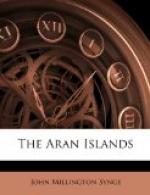Last year when I came here everything was new, and the people were a little strange with me, but now I am familiar with them and their way of life, so that their qualities strike me more forcibly than before.
When my photographs of this island had been examined with immense delight, and every person in them had been identified—even those who only showed a hand or a leg—I brought out some I had taken in County Wicklow. Most of them were fragments, showing fairs in Rathdrum or Aughrim, men cutting turf on the hills, or other scenes of inland life, yet they gave the greatest delight to these people who are wearied of the sea.
This year I see a darker side of life in the islands. The sun seldom shines, and day after day a cold south-western wind blows over the cliffs, bringing up showers of hail and dense masses of cloud.
The sons who are at home stay out fishing whenever it is tolerably calm, from about three in the morning till after nightfall, yet they earn little, as fish are not plentiful.
The old man fishes also with a long rod and ground-bait, but as a rule has even smaller success.
When the weather breaks completely, fishing is abandoned, and they both go down and dig potatoes in the rain. The women sometimes help them, but their usual work is to look after the calves and do their spinning in the house.
There is a vague depression over the family this year, because of the two sons who have gone away, Michael to the mainland, and another son, who was working in Kilronan last year, to the United States.
A letter came yesterday from Michael to his mother. It was written in English, as he is the only one of the family who can read or write in Irish, and I heard it being slowly spelled out and translated as I sat in my room. A little later the old woman brought it in for me to read.
He told her first about his work, and the wages he is getting. Then he said that one night he had been walking in the town, and had looked up among the streets, and thought to himself what a grand night it would be on the Sandy Head of this island—not, he added, that he was feeling lonely or sad. At the end he gave an account, with the dramatic emphasis of the folk-tale, of how he had met me on the Sunday morning, and, ‘believe me,’ he said, ’it was the fine talk we had for two hours or three.’ He told them also of a knife I had given him that was so fine, no one on the island ’had ever seen the like of her.’
Another day a letter came from the son who is in America, to say that he had had a slight accident to one of his arms, but was well again, and that he was leaving New York and going a few hundred miles up the country.
All the evening afterwards the old woman sat on her stool at the corner of the fire with her shawl over her head, keening piteously to herself. America appeared far away, yet she seems to have felt that, after all, it was only the other edge of the Atlantic, and now when she hears them talking of railroads and inland cities where there is no sea, things she cannot understand, it comes home to her that her son is gone for ever. She often tells me how she used to sit on the wall behind the house last year and watch the hooker he worked in coming out of Kilronan and beating up the sound, and what company it used to be to her the time they’d all be out.




